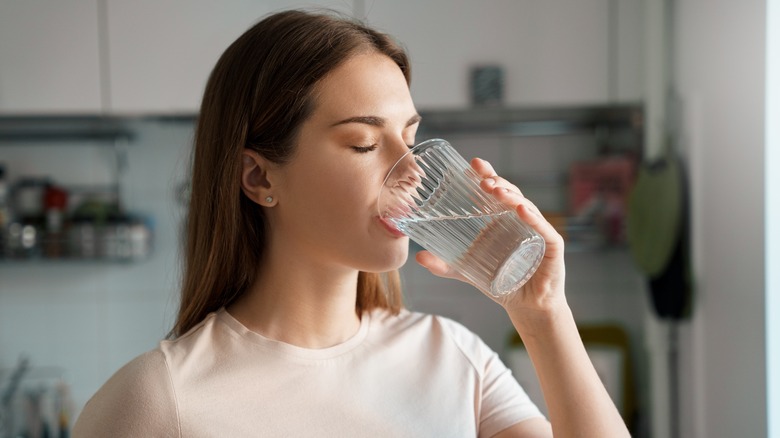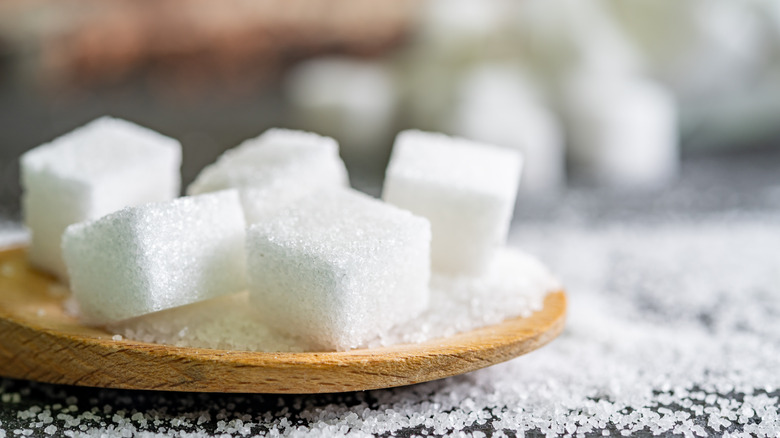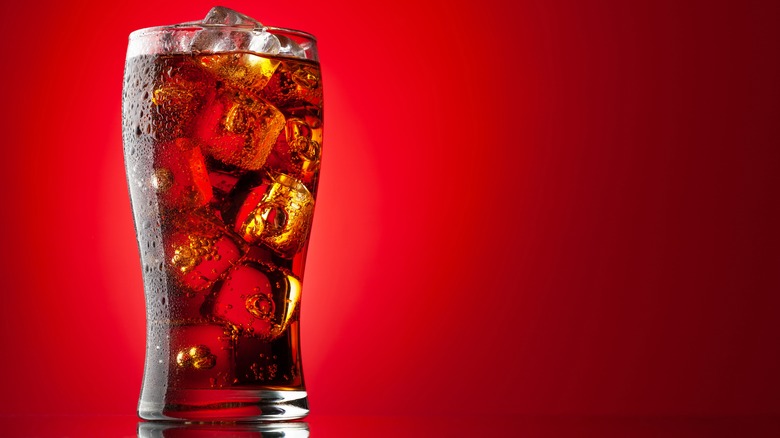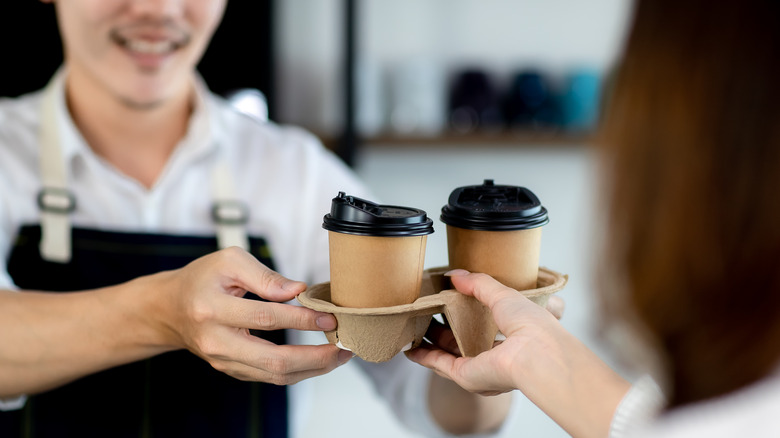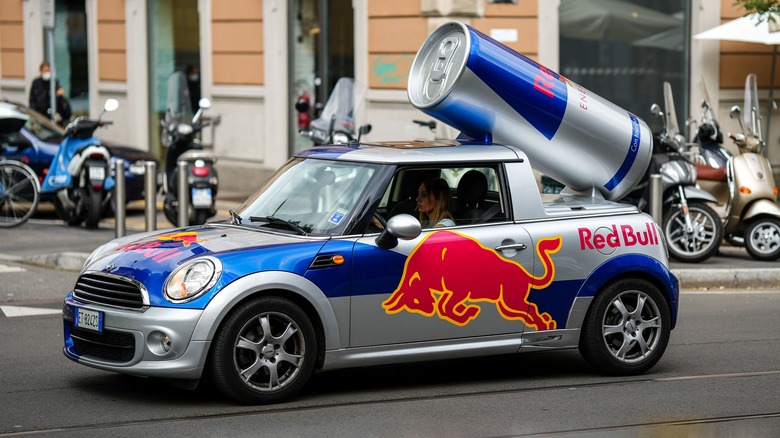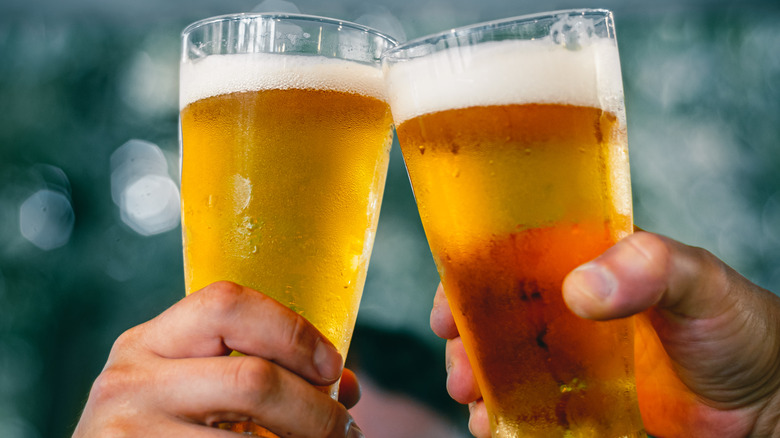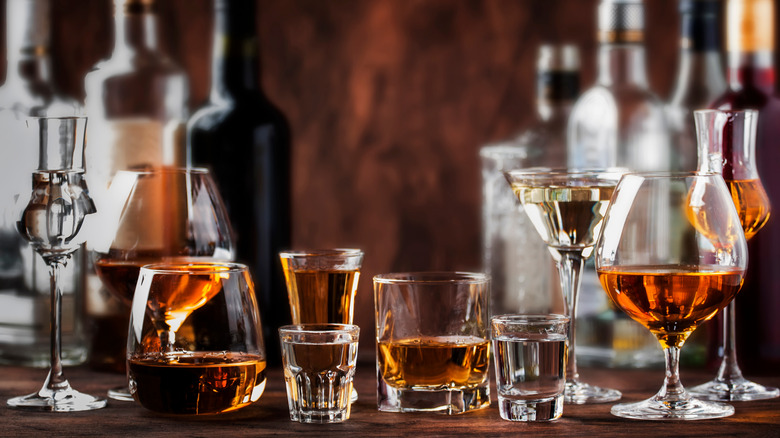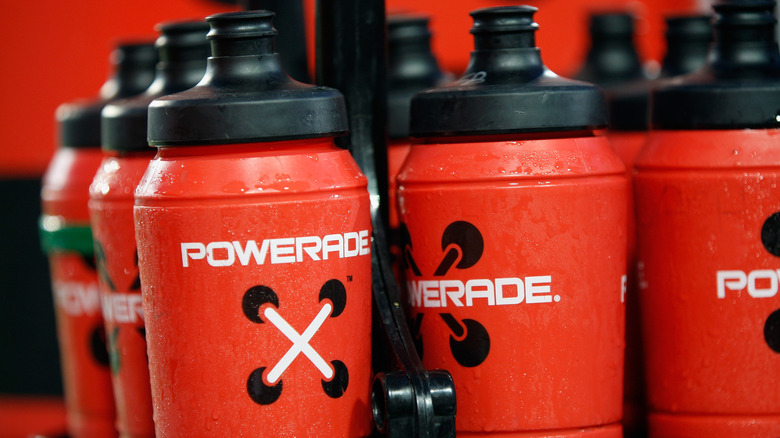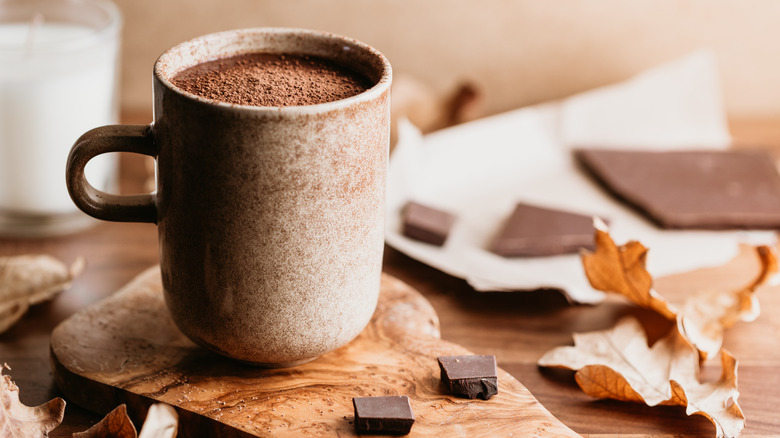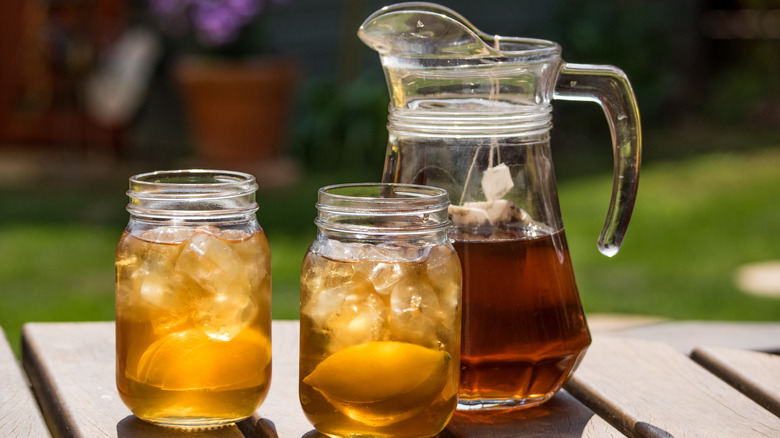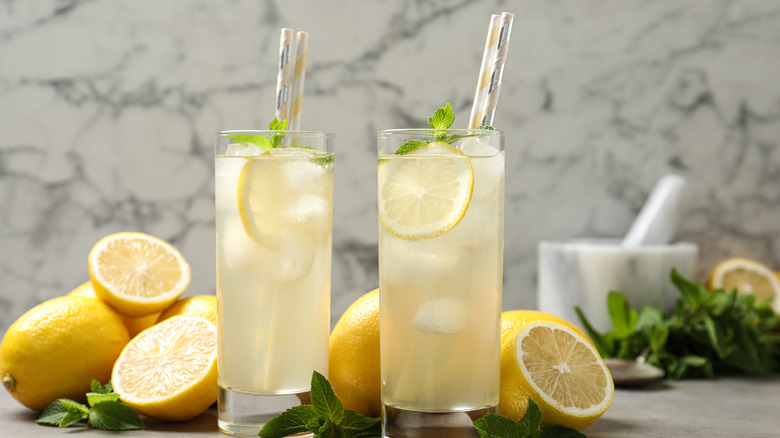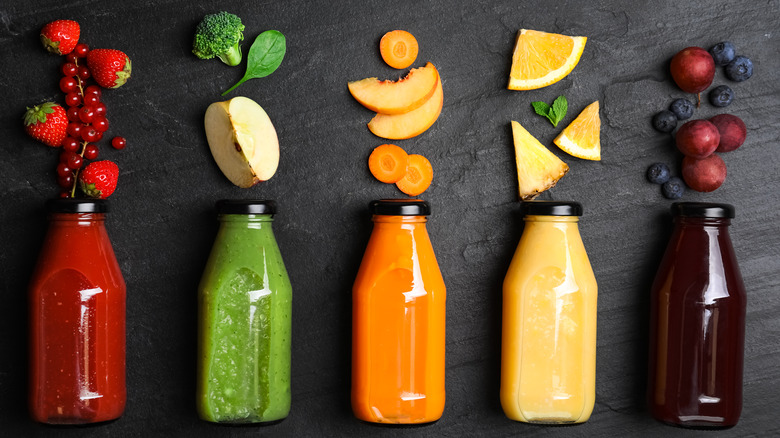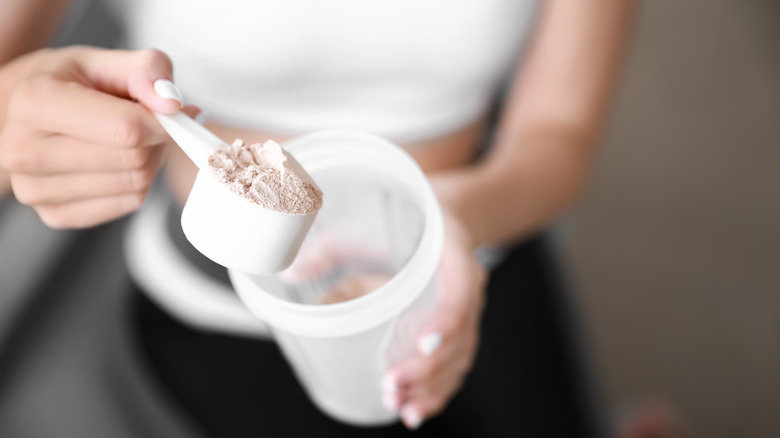These Drinks Are Making You Dehydrated And You Didn't Even Know It
Staying hydrated is a big concern for people of all ages and backgrounds, and many studies and surveys have found that a large percentage of Americans don't drink enough water. Among them, a 2015 study by the Harvard T.H. Chan School of Public Health found that more than half of U.S. children and adolescents aren't adequately hydrated. It doesn't take much dehydration for harmful effects to set in, either. As noted by the Cleveland Clinic, your body's water levels dropping by as little as 1.5% can be enough to cause symptoms such as headaches, tiredness, mental confusion, and even heat stroke.
So it's time to reach for your favorite beverage, right? Well, maybe not. As it turns out, some types of drinks lead to dehydration without you even knowing it. And according to the National Health and Nutrition Examination Survey for 2009 to 2012, up to 70% of an adult's total water intake comes from liquids and foods other than plain water (via CDC). That means a lot of opportunities for a seemingly refreshing drink to be drying up your body's fuel tank.
Let's look at some of the drinks that cause dehydration and why they might be draining your moisture. Whether you've just put in a heavy workout, have been walking around town on a hot summer day, or are relaxing by a winter fire, knowing what beverages to think twice about will help you feel great both now and later.
What causes a drink to be dehydrating?
Before going through the list of drinks that dehydrate you, we should consider why a liquid might make you less hydrated. There are three main factors that lead to dehydration from beverages.
The first and foremost consideration is sugar. As detailed by Livestrong, when your blood sugar reaches high levels, your body starts creating more urine to flush the sugar out. This fluid loss can lead to dehydration. It's especially of concern for diabetics and others with inadequate insulin response.
Caffeine is another reason a drink can be dehydrating. Studies by Urology Annals and others have shown that caffeine can act as a diuretic when consumed in high amounts. A diuretic is something that helps the body get rid of fluid (via Healthline). If you're already on the edge of dehydration, caffeine can push you over.
Finally, there's alcohol. Healthline notes alcohol is also a diuretic and that the dehydration it causes is what leads to a hangover. Alcohol can dehydrate you both because it removes fluids from the bloodstream and because your body produces urine to flush out alcohol's components. Its dehydrating effects are accelerated on an empty stomach since the alcohol is absorbed faster.
Now that we've gone over some (but not all) the ways a drink can make hydration worse, it's time to see which beverages have the most potential to leave you feeling high and dry.
Soda
Since the first U.S. soda pop was created in 1866 — Vernon's Ginger Ale, according to RFD TV — Americans have loved their soft drinks. Although consumption has trended downward somewhat in recent years, the average adult still drinks nearly 39 gallons a year as of 2018 (via Statista).
And all that pop might be dehydrating you. A 2016 study published in the Journal of Applied Physiology found that rehydrating with soft drinks and similar beverages made dehydration worse, even if total fluid intake was higher. It also increased the risk of sudden renal injury, such as kidney damage.
The main reason soda can cause dehydration appears to be the sugar. The USDA Food Central database notes the average cola contains 39 grams of sugar per 12-ounce can — this equates to 65 grams for a 20-ounce bottle. Livestrong notes that many sodas also contain caffeine, which can worsen the effects when consumed in large amounts — especially if you live in an area that's hot and dry.
Furthermore, the Cleveland Clinic lists craving sugar as a sign of dehydration. This can lead to drinking more soda and making your hydration issues even worse. One silver lining is that it appears diet soda does not have the same dehydrating effects. Still, you should consume artificially sweetened soda in moderation because of its other potential health risks.
Coffee
Coffee is one of the most popular beverages in the U.S.; a 2022 survey by the National Coffee Association found that 66% of American adults drink it every day. Is all that coffee making you dehydrated? Let's start with the good news: A 2014 study in PLOS One determined that moderate amounts of coffee did not cause dehydration. So one or two small cups per day is likely not going to hurt your body's water levels.
Now for the bad news: Scientists and nutritionists agree that, in high amounts, caffeine found in coffee can dehydrate you. A 2017 Frontiers in Nutrition study found that drinking coffee with 6 milligrams of caffeine per kilogram of body weight caused significant diuretic effects. In layman's terms, if you're the average American adult male weighing 197.9 pounds according to Healthline, having about 540 milligrams of caffeine per day would be enough to start drying out your system.
That might seem like it would take a lot to dehydrate you, but people quaff a lot of coffee. The NCA notes the average coffee drinker downs 3.1 cups per day. And according to Medline Plus, a typical 8-ounce cup of joe can contain anywhere from 95 to 200 milligrams of caffeine. So if you're drinking 3.1 Starbuck Veranda Blend coffees, which contain 360 milligrams of caffeine in the Grande size, then you might be dehydrating yourself. In addition, adding sugar contributes to dehydration.
Energy drinks and pre-workouts
Pumping yourself up now could lead to dehydration later. Energy drinks, along with their even higher-intensity cousin the pre-workout, have been linked to dehydration by experts. A scientific review published in the International Journal of Health Sciences notes the high levels of caffeine found in energy drinks cause an increase in urine production, meaning more water is pulled out of your system.
The review also notes this caffeine intake — 70 to 100 milligrams per 8 ounces in most energy drinks, according to MedlinePlus — leads to losing more sodium through urine, which hurts the body's ability to retain water. Not only that, but many energy drinks contain insane amounts of sugar, such as the 63 grams in one can of Rockstar Original (via Nutritionix). The resulting high blood sugar levels further worsen dehydration by causing your body to urinate more and shift water out of cells, per Medical News Today.
These drinks are rapidly rising in popularity, making dehydration from energy drinks an even bigger concern. Statista reports the drink's sales in the U.S. rose every year from 2011 to 2021 with a 12.6% increase in 2021. And we haven't even mentioned the big irony. As noted by the Mayo Clinic, one of the major dehydration symptoms is fatigue — the exact opposite of why you're having an energy drink. So make sure that trying to get a jolt isn't tiring you out instead.
Beer
Can drinking beer dehydrate you? The short answer: Yes. As Healthline details, alcohol is a diuretic, causing the body to remove fluids via the bladder and kidneys. Most notably, alcohol suppresses the production of vasopressin, a hormone that helps the body retain fluids. Your system will also produce more urine to remove alcohol waste products, such as acetate.
This adds up to dehydration. ABC Science observes that, for every 200 milliliters of a typical beer that you drink, you'll expel 320 milliliters of urine. In other words, you're putting out 60% more liquid than you're taking in. According to Medical News Today, drinking on an empty stomach can hasten the effects of alcohol-induced dehydration, which is especially of concern since large amounts of alcohol act as an appetite suppressant.
All that being said, you shouldn't automatically assume a single beer will turn your innards into a drought-stricken wasteland. A 2010 study published in Alcohol and Alcoholism found that lighter beers and smaller consumption levels aren't likely to increase dehydration — especially if you're already at a water deficit. However, stronger alcoholic beverages do contribute to being parched. According to a 2017 study in Nutrients, beers as low as 5% ABV (alcohol by volume) can cause a diuretic effect. Another study in the Journal of Applied Physiology determined that beverages with 4% ABV can hinder recovery from dehydration after exercise. So this 4% to 5% range seems to be the "tipping point" for worrying about lost fluids.
Wine and Liquor
When discussing dehydration and alcohol, it would be easy to lump wine and liquor in the same category as beer. After all, they both contain alcohol. However, wine, liquor, and spirits are worth discussing separately because their alcohol concentration is so much higher than beer. While the typical U.S. beer is about 5% alcohol by volume (ABV), wine is about 12% alcohol and distilled spirits are around 40% ABV.
What does this mean? As Next Health explains, the higher percentage of alcohol makes these harder drinks more dehydrating since you don't need to imbibe as much to get the same effect. Using the rules of thumb set by Healthline, a shot of liquor or small glass of wine has about the same impact on slowing antidiuretic hormone production and needing to flush out waste products as a glass of beer — but with less fluid intake to help offset these factors.
Considering wine or spirits are the drinks of choice for many U.S. adults according to a 2021 Gallup poll, many people need to be mindful of their effects on hydration. The Mayo Clinic recommends slowing consumption, having water between drinks, and eating food with your alcoholic beverage to help prevent hangovers or other dehydration symptoms.
Sports drinks
Sports drinks are touted by the makers as a magic elixir for all your hydration needs, but recent research has found that this could be a myth. A 2015 article in The American Journal of Clinical Nutrition saw the development of the "Beverage Hydration Index" to measure how effective certain drinks are at replenishing water levels. Researchers found sports drinks ranked near the bottom for hydration — worse than soda and only slightly better than lager beer.
How is this possible? For starters, Ace Fitness notes that sports drinks aren't as high in fluid-absorbing electrolytes as most people think — they have less sodium than milk and less potassium than coffee or tea. Sports drinks are also high in sugar, with a 20-ounce bottle of Powerade Mountain Berry Blast containing 35 grams. For the average person, this can cause blood sugar spikes that lead to dehydration (via Healthline).
Research concluding sports drinks help hydration has been called into question, with the investigative study "The Truth About Sports Drinks" positing that drink manufacturers have undue influence over the scientists. As noted by FiveThirtyEight, "conveniently, the studies that came from the GSSI (Gatorade Sports Science Institute) could be used to support the product's claims." Clearly, the science behind sports drinks and hydration is a topic of debate.
Hot cocoa
Ah, hot chocolate. It's a classic, wintertime comfort beverage — but you may be experiencing dehydration from your hot cocoa. According to My Food Data, a standard 8-ounce cup of a hot chocolate drink contains about 33 grams of sugar. That's almost 27% more sugar per ounce than soda based on info from the U.S. Department of Agriculture. As previously mentioned, all that sweetness causes dehydration.
Drinking hot cocoa can also lead to the same dehydration cycle as soda, especially if you're already below optimum hydration levels. Everyday Health reminds us that one of the common dehydration symptoms is a craving for sugar and sweets. And as Livestrong notes, sweet things make you thirsty because your body wants fluids to balance out the blood sugar spike. But this can lead to drinking even more of the sugary beverage that helped dehydrate you in the first place.
Looking for good news? We do have some. While cocoa does contain some caffeine — about 12 milligrams per serving — it is not considered a high enough amount to contribute to dehydration. And since people typically drink hot chocolate in cooler weather, you won't need to worry about summer heat removing further moisture from your body. Still, you should consume hot cocoa in moderation and balance it out with water or other non-sugary drinks.
Sweet tea
Tea is one of the most beloved beverages in the world. According to the Tea Association of the U.S.A., more than half of Americans drink some form of it every day. So let's start with the positive. In its basic form, tea is unlikely to cause dehydration as long as it has a low to moderate amount of caffeine (via Healthline). To become dehydrated from tea alone, Healthline says you would have to drink anywhere from 6 to 13 cups a day depending on its caffeine content, a claim supported by a 2011 study published in the British Journal of Nutrition.
However, sweet tea has a lot of sugar and other flavorings added. For example, Gold Peak Sweet Tea has 44 grams of sugar in a 16.9-ounce bottle. Dunkin' Donuts Iced Tea goes even higher with 58 grams of sugar. And registered dietician Lisa Andrews tells Livestrong, "Water will move from cellular tissue to the bloodstream to help reduce blood sugar, which can lead to dehydration." When combined with caffeine, the result is much like drinking a bottle of soda. The Harvard T.H. Chan School of Health recommends flavoring your iced tea with a splash of citrus juice or some fresh herbs instead, which will give you a great taste without all the dehydrating sugar.
Lemonade
Just as drinking tea by itself does not affect hydration, water and lemon juice by themselves won't cause you to dry out. In fact, a glass of lemon water has many health benefits — hydration being one of them.
But making lemonade adds a third ingredient: lots of sugar. A medium Chick-Fil-A lemonade contains 55 grams of the stuff, while the same size at Sonic has a whopping 64 grams. Like other sugary drinks, lemonade causes dehydration via both decreased cell volume due to higher blood sugar and more frequent urination (via Medical News Today). As Beyond Type 1 points out, the resulting dehydration can also cause blood sugar spikes since the existing sugar in your system is more concentrated, compounding the effects.
It's all enough to cancel out many of the benefits of lemon water, such as the presence of pectin, which normally helps balance out blood sugar. To enjoy a citrusy taste while remaining hydrated, add fruit to your water, or try raw honey, fresh ginger, or mint sprigs.
Fruit juice
The word fruit implies it's healthy, but that may not be true when it comes to juice and hydration. Fruit juice cocktails get the worst rap, as even 100% juice has high amounts of sugar. While it depends on the type of juice, FatSecret lists an 8-ounce cup of grape juice as having 37 grams of sugar. And most people drink more than two cups of juice in a single sitting.
Even though this sugar is natural, research published in Clinical Nutrition found that 100% juice was positively associated with high blood sugar just like added sugar in other beverages. It's worth noting that not all research agrees with this conclusion. For example, the Beverage Hydration Index published in The American Journal of Clinical Nutrition found that orange juice outperformed some beverages, such as tea, diet cola, and sparkling water. Still, most experts recommend looking for alternatives if you need to hydrate.
Protein shakes
You may be wondering how you can get dehydrated from protein shakes. After all, they usually don't contain caffeine or alcohol. But as Livestrong notes, while protein has many benefits for post-workout recovery and overall health, you do need to watch out for dehydration.
Most notably, a study by the UConn Department of Nutritional Sciences indicates a high-protein diet is correlated to getting dehydrated (via the University of Connecticut Advance). Notably, tests indicated that high protein consumption caused abnormal levels of blood urea nitrogen, a toxic waste product that is a measure of kidney function. A 2015 scientific review by Advances in Nutrition expanded on this, noting that increased nitrogen levels cause the body to produce more urine to flush everything out.
While research is still being conducted, the safest thing is to pair a protein shake with other fluids. Research in Amino Acids found that whey protein isolate shakes didn't affect post-workout if the person drank 150% of the fluid volume they lost through sweat. The takeaway: Sip lots of water to go with your shake.
